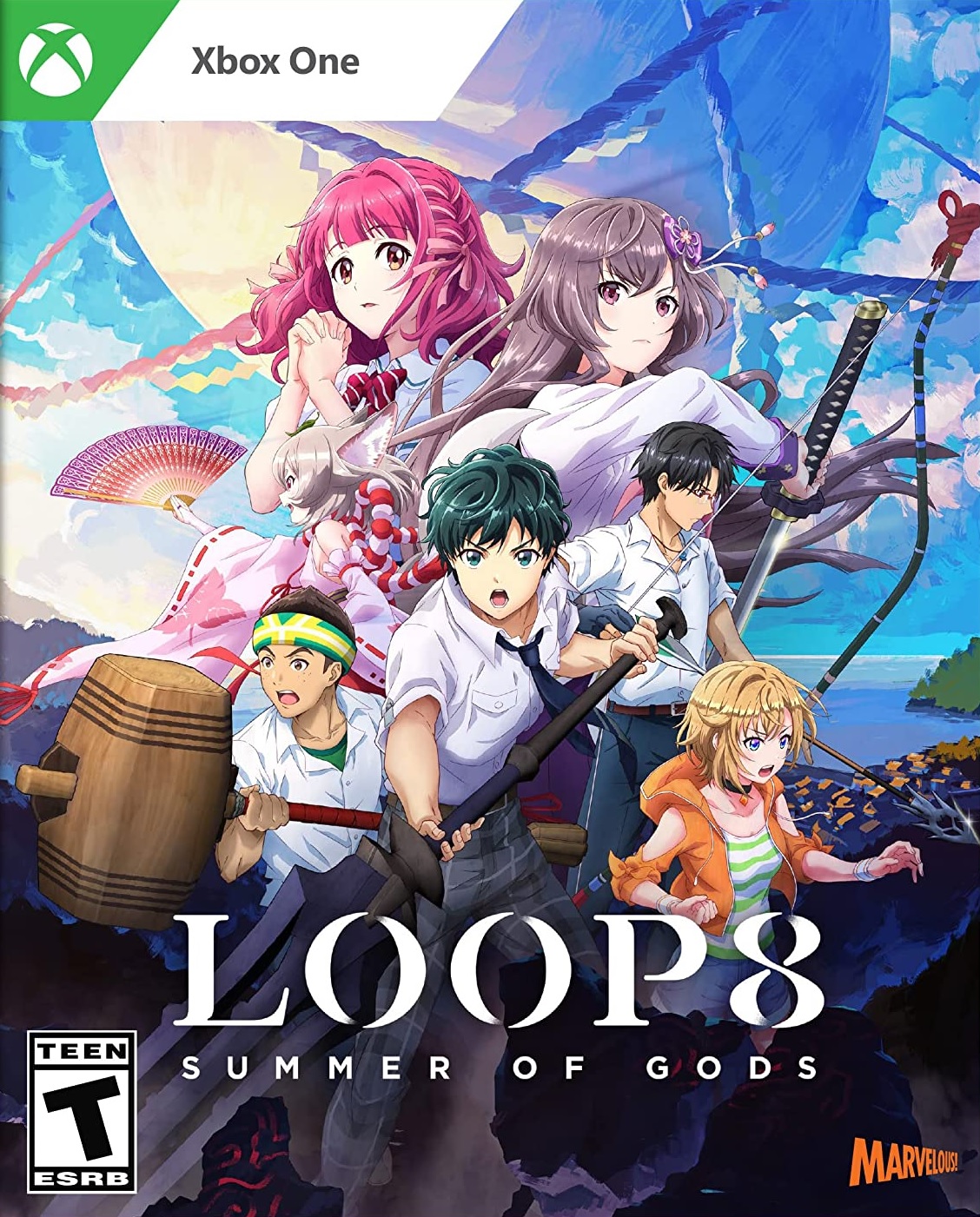Loop8: Summer of Gods
Developer: Sieg Games
Publisher: XSEED Games/Marvelous
Platforms: Xbox One (Reviewed), Playstation 4, PC, Switch
Release Date: Available Now
Price: $49.99 USD – Available Here $79.95 AUD – Available Here
Overview
The concept of a time loop isn’t uncommon among video games, especially when one attributes it to the roguelike genre where players start over from the beginning, only slightly stronger or having more resources for their next loop. Usually these types of games involve things such as escaping a dungeon, facing numerous monsters, or conquering a difficult puzzle without failing but what happens when you take a looping element and blend it with JRPG gameplay and visual novel storytelling? You get Marvelous’ Loop8: Summer of Gods. Featuring a school-life setting with an ever approaching world-ending threat, do these elements manage to blend together to create a satisfying JRPG?
Story
The year is 1983 and humanity has been pushed to the brink of extinction by supernatural beings known as the Kegai that are nearly unstoppable and can devastate entire countries when they appear. Humanity has made an attempt to flee to space but our protagonist, Nini, has found out the hard way that the Kegai are just as capable of reaching space as humanity. Being a survivor of the destroyed space station, Nini arrives in the small town of Ashihara where his only relatives reside and just so happens to be a location untouched by the Kegai’s advances. Things quickly appear strange however, as not only can Nini see a massive structure floating in the sky above town but before he can even settle in and learn about his classmates, danger strikes as a Kegai manages to break into the town.
Despite having no knowledge of his abilities, Nini encounters the Kegai within the alternate world of Yomotsu Hiarasaka, a twisted version of Ashihara. Despite the group’s best efforts to try and stop the Kegai from flourishing they are all slain by the beast before it goes on to lay waste to the rest of the world. All may seem lost but when Nini suddenly finds himself standing back in front of the train station where he arrived in town at the beginning of August. Although confused as to why such a loop occurs, it is up to Nini to put a stop to the Kegai that are invading the town and potentially save all of his new friends at the same time.
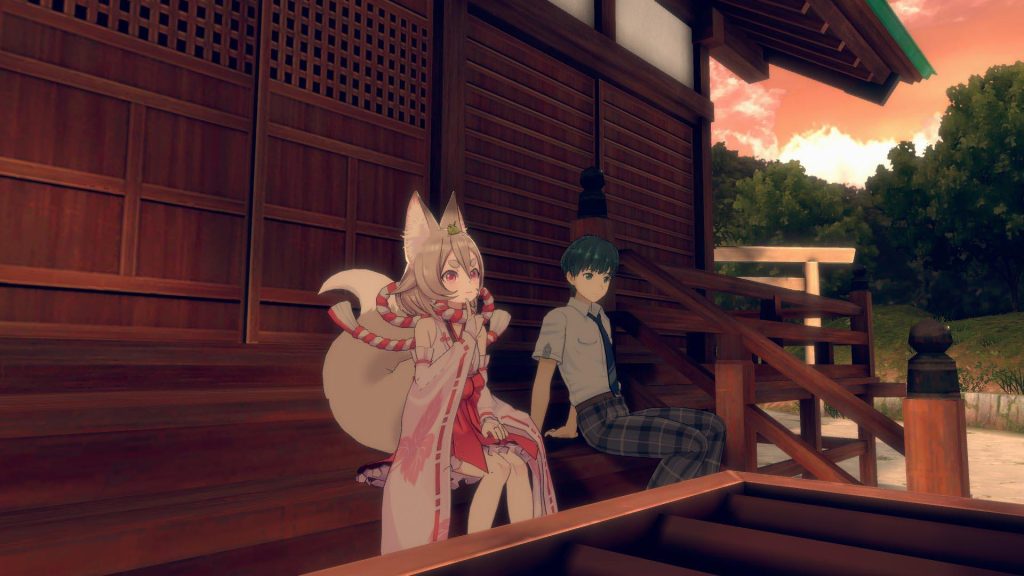
Loop8: Summer of Gods has a rather interesting story to tell, the problem is that actually getting it to reveal various story elements is something of a pain. A lot of context surrounding the world and its situation as well as even the events that are directly happening to Nini and the rest of the townsfolk are often kept vague and even the core storyline itself is relatively thin. The real meat of the story comes from interacting with the twelve characters that reside within the town and the only ones players will ever actually see. Numerous story revelations, details about the world, and even knowledge about what is actually happening is revealed by getting closer to the various characters as they explain various tidbits of history, talk of where their from, or even randomly reveal a significant story element as if it were nothing.
You see, rather than building a relationship with characters through various choices over a long period of time or even through events, players will instead build their friendship, affection, and hate level by simply talking to characters and selecting generic dialogue prompts. These range from something like “get to know each other” or “be friendly” to “compliment” and “tell it like it is” with each interaction returning a generic response of either success or failure with failure rates increasing the more Nini talks with a character in one day. Since time doesn’t pass by talking to characters, it is entirely possible to reveal large amounts of history for a character and even major elements of the world itself by being friendly enough with the cast far too early, with two separate characters making major reveals within the second day of interacting with them outside of the initial loop.
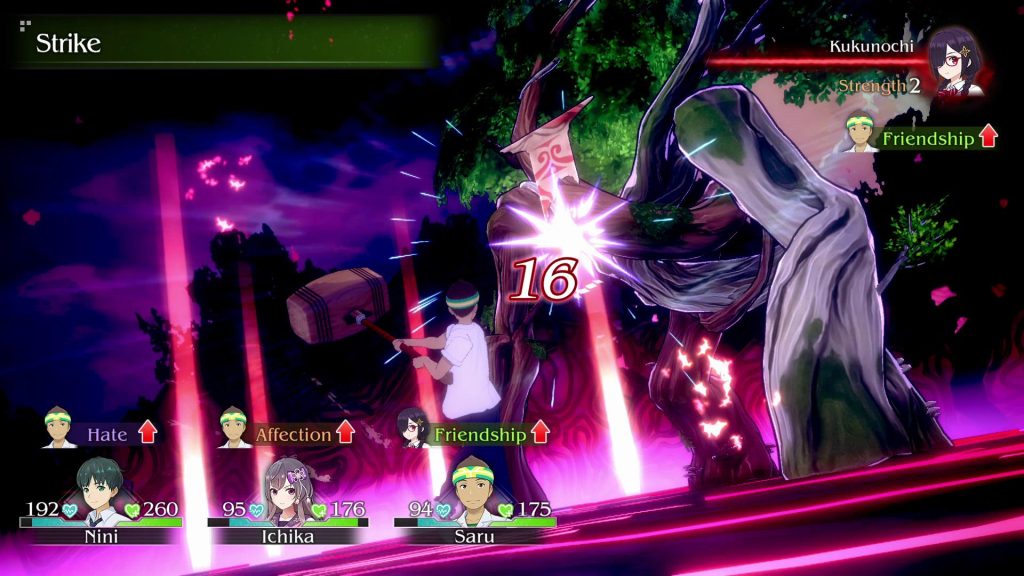
The ability to quickly become friends with characters isn’t a real negative, especially since it can play a major role in how players can steer the story. Not only are there certain unique events that can only be seen when players are close enough to a character but often the only way to save a possessed member of the town is by being friends with them first otherwise they may meet a terrible end even if the Kegai is defeated. The characters in Loop8: Summer of Gods are rather interesting and while they may fall into some standard tropey elements initially, players will quickly learn some surprising details about them as they learn about their history. Characters such as Machina, Terasu, and Beni serve as some great standouts and the rest of the cast is very interesting as well, meaning players will want to try their best to keep everyone alive, even if it means looping again, especially since characters can react to the death of another. Combine the enjoyable cast with some unique ways the story will play out differently every loop and there is a lot of potential in Loop8: Summer of Gods, though players will need patience for a certain poor design element we will go into momentarily to enjoy it.
Gameplay
While Loop8: Summer of Gods may feature turn-based gameplay in a dungeon, players will be spending the majority of their time walking around the town of Ashihara, talking to the twelve residents, and interacting with various objects to train their stats or potentially unlock blessings. The town of Ashihara is surprisingly small with there only being six main locations to travel to with a few having secondary screens to explore. Players can walk to these areas should they wish to, though they can choose to fast-travel while also seeing what characters are currently at the location, though since time passes while traveling they may not be there when you arrive.
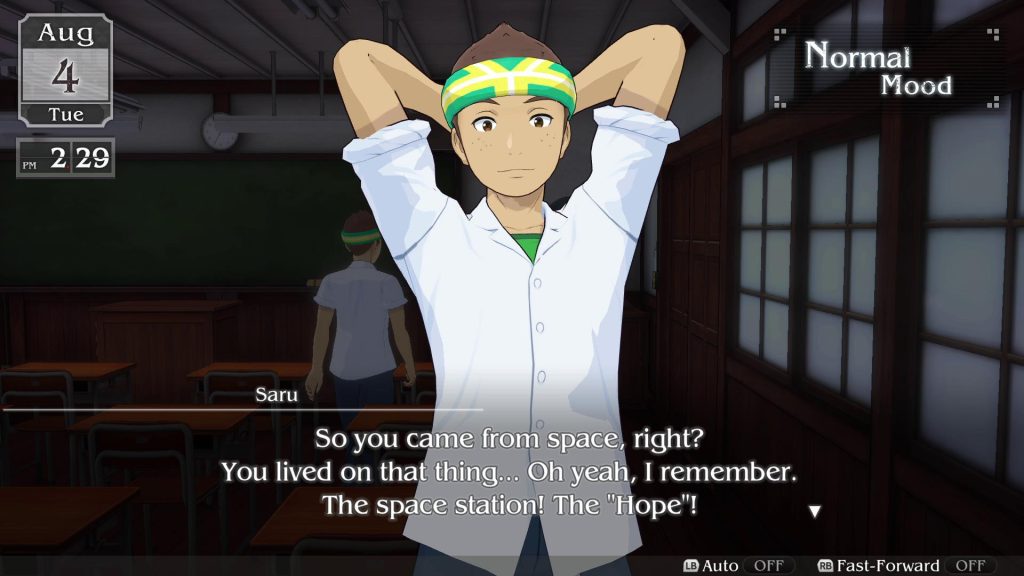
Speaking of time, players will experience every day waking at 6AM and being forced to sleep at 3AM, at the latest though their stamina and health meter must be used for fast-traveling and interacting with characters. Should players run out of energy they will be forced to end the day early, though they can eat food, interact with certain characters, or even take a nap to regain energy. Different activities such as studying at school, reading magazines, or even interacting with certain characters depends on the time of day with one second of real time equaling a minute game time. Characters may not have an entirely set path through each day, they will still walk around town, though players can easily interrupt anything they may be doing since characters are always just standing around.
As mentioned before, characters will raise their affinity with characters by talking with them and selecting various “suggestions” with the success rate depending on their social standing, the character they are talking to’s attitude, and even the current mood of the location. Time can also play a factor as characters won’t want to go out to eat or start training with Nini if it is too late. The developers have stated that there is a unique AI system that dictates how characters will respond to being talked to but for the most part players will either see complete success or be stonewalled depending on how their target is feeling. In fact, there may even be moments when a completely cheerful interaction with a happy character will suddenly turn sour as they instantly are angry the second. Nini possesses the ability known as “Demon Sight” that can be used to examine the attitude and desires of the people in town as well as in combat. This can help determine whether players should even interact with certain characters sometimes as an angry or tired character will likely only grow to hate the player if they try to talk with them.
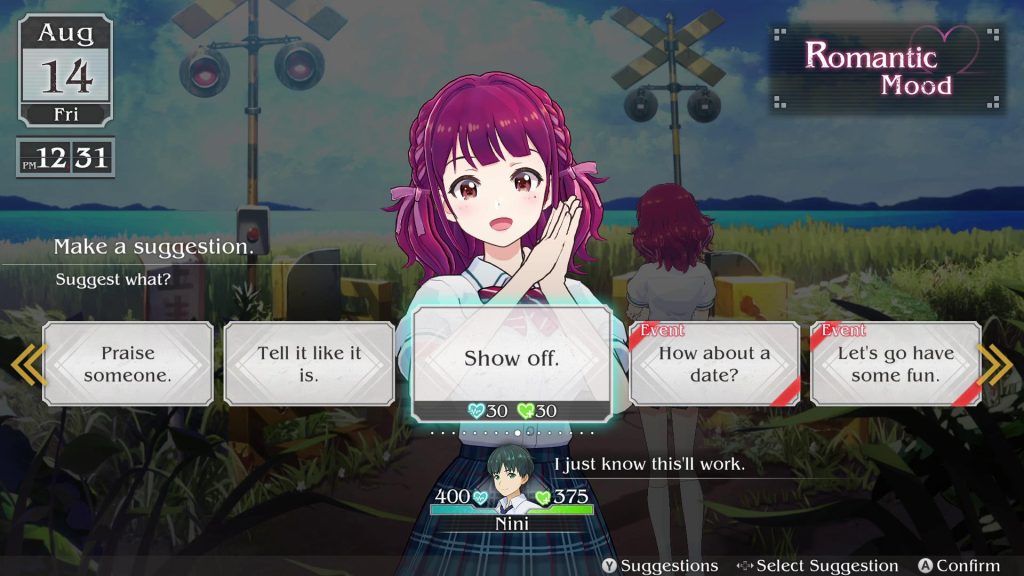
As players talk with characters and unlock various events they will obtain blessings specific to that character. Blessings are stat and affinity boosts that are permanently applied to a character and will remain even if the loop resets and serve as a major way to upgrade a character’s abilities. Blessings can also be obtained from examining shrines around town with Nini primarily being the benefactor unless he is traveling with someone at the time. Blessings are quite helpful as other forms of stat boosting take 90 minutes of time and reset when the loop begins again and can also make it far easier to become friends with various characters again.
After a set amount of time passes, a Kegai will invade and will randomly possess someone within the town, whisking them away to the underworld where players must venture in and defeat them. There is only one real dungeon in Loop8 and it is fairly generic as it is simply an alternate version of Ashihara except it has various monsters inside of it. Some of these monsters will simply talk with Nini while others will actively attack him. Nini can bring two allies with him into a dungeon but when fighting in battle they will not actually listen to any commands. Instead players will only be able to directly control Nini in battle while the ally AI will attack and buff on their own. This can lead to some frustration in combat especially since the game does not have any form of level with all stats being dictated by player activities during everyday life. As Nini players can select various skills and use their friendliness, affection, or hate to power the attack with hate dealing extra damage at the cost of powering up the target. Since players cannot directly control their allies it is entirely possible they may die in battle and these deaths will remain throughout the current loop. Similarly, defeating the possessed character may also end in their death. This can lead to some frustration, especially should the former happen as often deaths in combat happen due to ally AI refusing to attack properly.
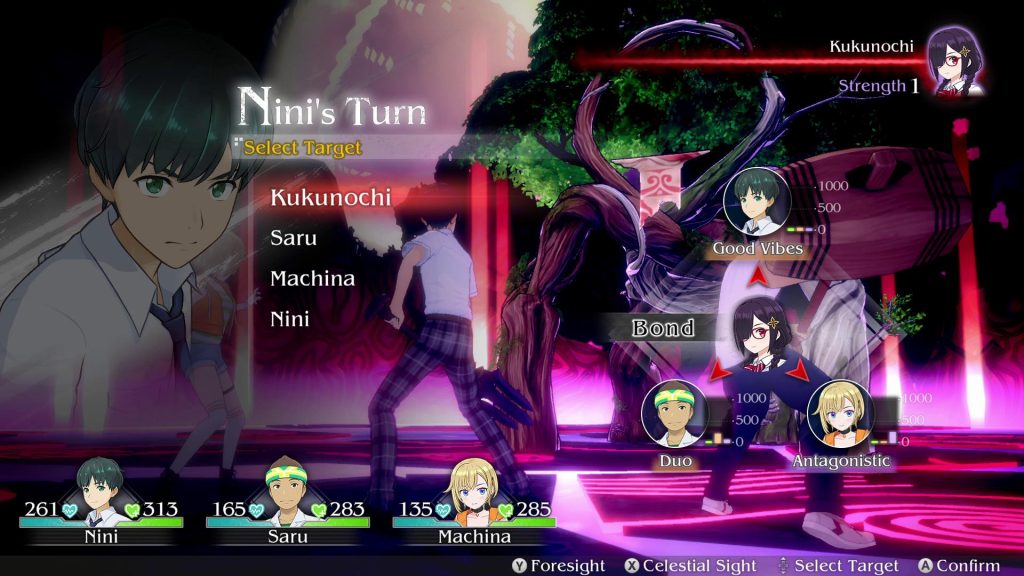
Not having direct control of your team isn’t the only poor design choice in Loop8 though, as most of them revolve around the looping system itself. Should players die in combat, fail to defeat a boss before the world ends, or even choose to reset the loop themselves, they will start back over from the first day with all of their stats and relationships reset to zero. As mentioned before, all blessings will remain so players will start stronger and closer to characters but they will need to repeat various actions to regain their former strength and bonds. One way that makes this a bit more balanced is that bonds and stat growth is doubled until it reaches its former level so players will need to invest less time than before, though they will still need to go through the same motions and this is where one of the biggest issues with Loop8‘s actual loops is.
Rather than offer unique interactions that change depending on the loop, all character interactions are handled the same exact way as before. This means that players will be treated to the exact same dialogue, cutscenes, events, and even dates as before with the only reprieve being a slow skip option that is barely faster than mashing the advance button. There is some variety with who gets possessed as some characters may find themselves instantly taken in one loop only to never be possessed the next time around. This makes any loop an exercise in patience and frustration as players must rebuild their bonds and character while experiencing barely skippable repeat scenes anytime they fail or risk failing again. Any extra level of variety to repeated scenes or even a faster skip option for previously seen dialogue would do wonders for the flow of the game and spice up the story more. Instead players are treated to the same things they’ve seen before, quickly growing monotonous by the third or fourth time through a loop.
Visuals & Audio
Loop8: Summer of Gods has a number of rather interesting artistic choices when it comes to the world. The environments are nicely detailed and wonderfully colored, though they could use more variety considering the amount of time players will travel through them and the animations are rather strange. The team seems to have chosen to animate the characters in a lower framerate than the game itself, giving them an awkward appearance that stands out heavily during combat, though thankfully combat animations can be skipped through the settings. The actual character models themselves are handled nicely with each character having a unique enough look and number of expressions to go along with player interactions but unfortunately the same cannot really be said about the enemy types as, outside of bosses, enemies are incredibly generic looking.
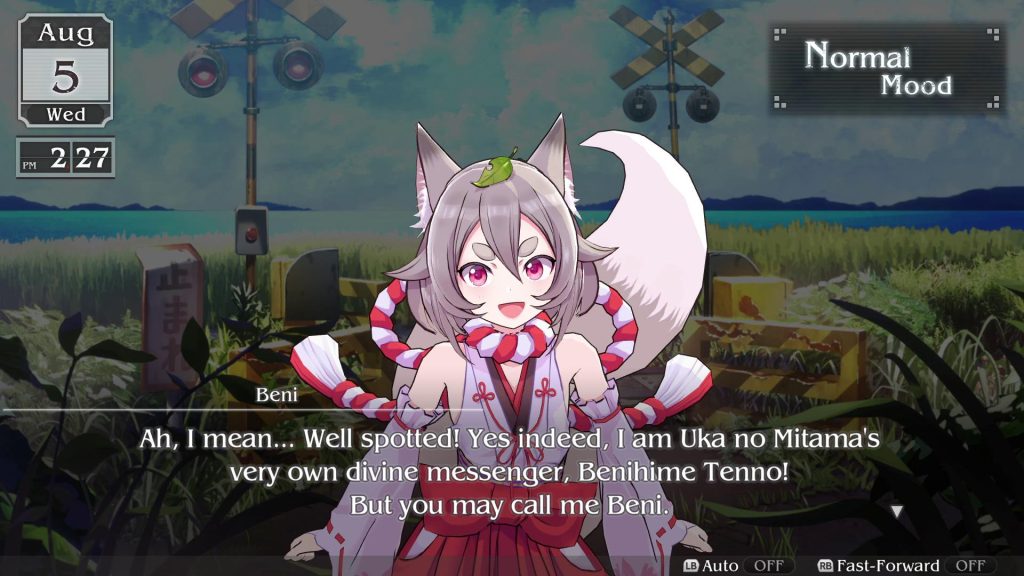
The voice work throughout Loop8 is handled well with both an English and Japanese voice track accompanying the game. It is a bit disappointing that not all of the game’s dialogue is voiced but most is and thankfully players can even choose to mute the Musasa squirrel should they wish. The soundtrack features a great collection of background music with a number of softer tracks that work incredibly well during the slow life of living in the town and some solid background music to accompany dungeon exploration and combat.
Overall
This unique blend of genre has made Loop8: Summer of Gods an interesting game with some solid potential that is unfortunately dragged down by some far too obvious repetition and a few odd design choices. While its main storyline may not be the most interesting, the characters and world building that comes from growing close with the cast is endearing enough that players will want to do everything they can to avoid a long lasting death but unfortunately any loop sees lengthy repetition of barely skippable dialogue and scenes that undergo no changes from loop to loop. Combine this with combat that is a bit on the simplistic side and often cheap thanks to poor ally AI and Loop8’s unique premise of looping through a rural summer town loses a lot of its potential, though it is certainly worth checking out for those willing to deal with its repetitive nature.
Capsule Computers review guidelines can be found here.


